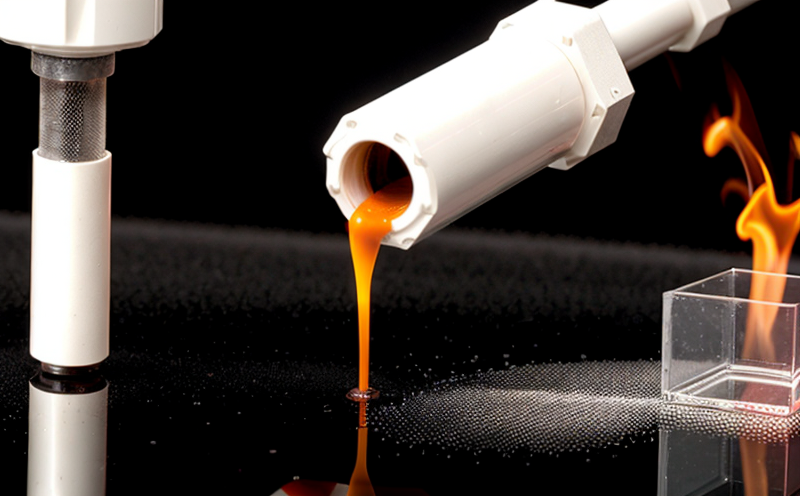DIN 53765 Thermal Degradation Resistance of Nano Modified Plastics
The DIN 53765 standard is a crucial tool in evaluating the thermal stability and degradation resistance of nano-modified plastics. This test protocol provides a standardized approach to assess how these materials behave under elevated temperatures, ensuring their reliability and performance over extended periods.
Nano-modified plastics have become increasingly popular due to their enhanced mechanical properties, reduced weight, improved electrical conductivity, and other benefits. However, the presence of nanomaterials can also introduce unique challenges in terms of thermal stability. DIN 53765 addresses these concerns by specifying a rigorous testing procedure that helps manufacturers ensure their products meet stringent quality standards.
The test involves subjecting samples to controlled heating conditions until degradation occurs or after reaching predetermined temperature thresholds. Key parameters include the maximum temperature, duration, and rate of heating. The goal is to observe changes in physical properties such as mass loss, color change, chemical composition alterations, and structural integrity.
Preparation of test specimens is critical for accurate results. Samples must be cut into standardized shapes that are representative of real-world applications while ensuring uniformity across multiple samples. Surface contamination or irregularities could lead to misleading data. Once prepared, the samples undergo conditioning according to specified humidity levels before being subjected to thermal treatment.
Thermal stability testing equipment plays a vital role in achieving precise and reproducible results. Furnaces with precise temperature control systems are essential for maintaining consistent heating conditions throughout the test duration. Additionally, optical emission spectrometers (OES) or Fourier Transform Infrared Spectroscopy (FTIR) may be used to monitor changes in chemical composition.
After completing thermal degradation tests using DIN 53765, detailed reports are generated summarizing findings including observed physical and chemical changes. These reports serve as valuable references for quality assurance processes ensuring products comply with relevant international standards like ISO 9001 or IEC 62471.
Understanding the importance of this test lies in its ability to predict long-term performance under operational conditions, which is particularly significant given increasing demand for sustainable materials. By adhering strictly to DIN 53765 guidelines during development stages, manufacturers can avoid costly rework later on and gain competitive advantage through consistent quality assurance practices.
In summary, DIN 53765 thermal degradation resistance testing of nano-modified plastics offers a robust framework for assessing material performance at elevated temperatures. Its application ensures reliable outcomes across various industries ranging from automotive manufacturing to electronics production where high-temperature applications are common.
Why It Matters
The integrity and longevity of nano-modified plastic components depend heavily on their thermal stability, especially in environments characterized by prolonged exposure to heat. Ensuring that these materials meet stringent quality standards is paramount for maintaining product reliability and safety.
- Enhanced Performance: DIN 53765 helps manufacturers identify potential issues early in the development process, allowing them to make necessary adjustments before full-scale production begins.
- Safety Compliance: Regulatory bodies worldwide require compliance with specific standards like DIN 53765 when dealing with thermally sensitive materials. Meeting these requirements ensures product safety and prevents recalls or legal disputes.
- Sustainability: By optimizing thermal stability, manufacturers can extend the lifespan of products made from nano-modified plastics, reducing waste generation and promoting more sustainable practices within their supply chains.
The outcome of such rigorous testing contributes significantly towards building trust among consumers who expect reliable performance from high-tech materials used in everyday devices. Furthermore, it supports broader industry efforts aimed at fostering innovation while adhering to stringent environmental regulations.
Quality and Reliability Assurance
The implementation of DIN 53765 thermal degradation resistance testing is integral to achieving consistent quality across batches of nano-modified plastics. This ensures that each product meets specified performance criteria, thereby enhancing customer satisfaction and reducing the risk of defects reaching end-users.
Quality assurance teams play a key role in overseeing this process by implementing robust procedures from sample selection through final analysis. They collaborate closely with R&D engineers to define appropriate test parameters tailored specifically for different types of nano-modified plastics used in various applications.
Regular audits conducted throughout the testing cycle help maintain adherence to best practices, ensuring that all steps are followed correctly. These include precise preparation methods, accurate measurement techniques, and thorough documentation of observations made during each stage.
In addition, collaboration between internal stakeholders such as procurement departments allows for better sourcing decisions based on supplier performance metrics derived from these tests. By prioritizing suppliers who consistently produce materials meeting DIN 53765 requirements, companies can further enhance their reputation for delivering high-quality products.
The commitment to quality and reliability through rigorous testing not only benefits individual organizations but also contributes positively to the overall industry landscape by promoting innovation while upholding ethical business practices.
Environmental and Sustainability Contributions
- Eco-Friendly Materials: By ensuring thermal stability, nano-modified plastics contribute to reduced material waste through extended product lifecycles. This aligns with broader sustainability goals by minimizing resource consumption during manufacturing processes.
- Energy Efficiency: Enhanced performance under high-temperature conditions translates into more efficient use of energy resources across various sectors utilizing these materials. This reduces carbon footprints associated with production and operation activities.
- Recycling Potential: When properly designed, nano-modified plastics can be recycled without losing significant quality attributes. This promotes circular economy principles by facilitating reuse rather than disposal after single-use applications.
The use of DIN 53765 thermal degradation resistance testing supports these environmental initiatives by providing insights necessary for optimizing material compositions and processing techniques. As industries continue to adopt greener approaches, compliance with such standards becomes increasingly important in driving positive change towards more sustainable future.





